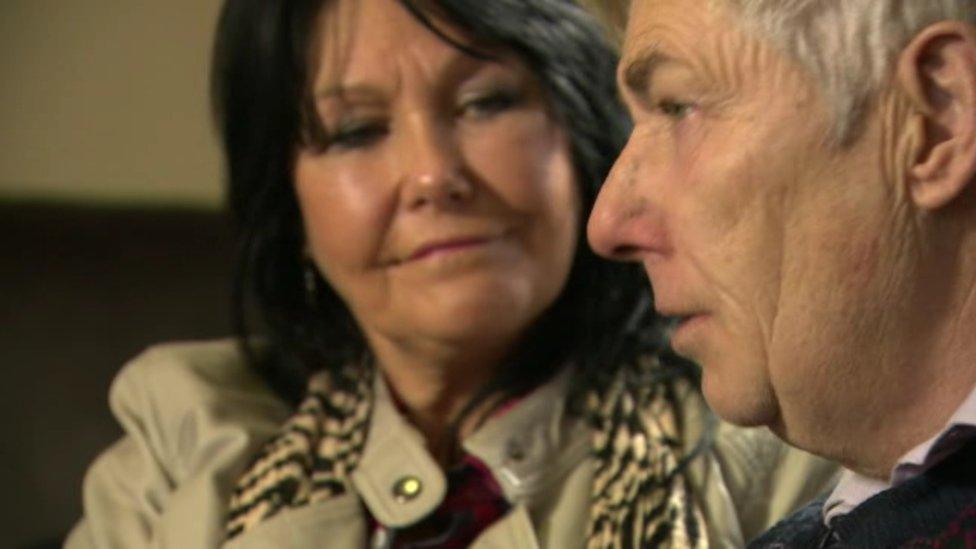Abuse apology long-awaited after traumatic decades
- Published
Some of the children were sent to Rubane House, Kircubbin, which was run by the De La Salle brothers
"The beatings. The coldness. You never saw a smile."
Jimmy Stewart recounts experiences which are piercingly harrowing - but not uncommon.
He is one of thousands of survivors of institutions for children in Northern Ireland, where abuse of young residents was widespread.
When he was eight, Jimmy was taken into Nazareth Lodge in Belfast - a place he quietly describes as "a nightmare".
His mother had died of cancer, aged 32. His father was deaf and unable to speak.
"Though he tried to look after us, he couldn't," Jimmy says.
He remembers the nun who met him and his younger brother Patrick at the door called them "wee mongrels".
The boys didn't know what that meant at the time, but later learned it was a reference to his parents' mixed marriage - one was a Catholic, the other a Protestant.
"That's what we got from then on. Any time you got into trouble - you were a mongrel."
Vivid memories of abuse
Emotional and psychological abuse of this nature was frequently detailed in the report of the public inquiry into historical institutional abuse, published in 2017.
The inquiry, chaired by the late judge Sir Anthony Hart was, at the time, the biggest investigation into the mistreatment of children ever held in the UK.
It also documented sexual and physical abuse, at a number of institutions, mostly run by religious orders.
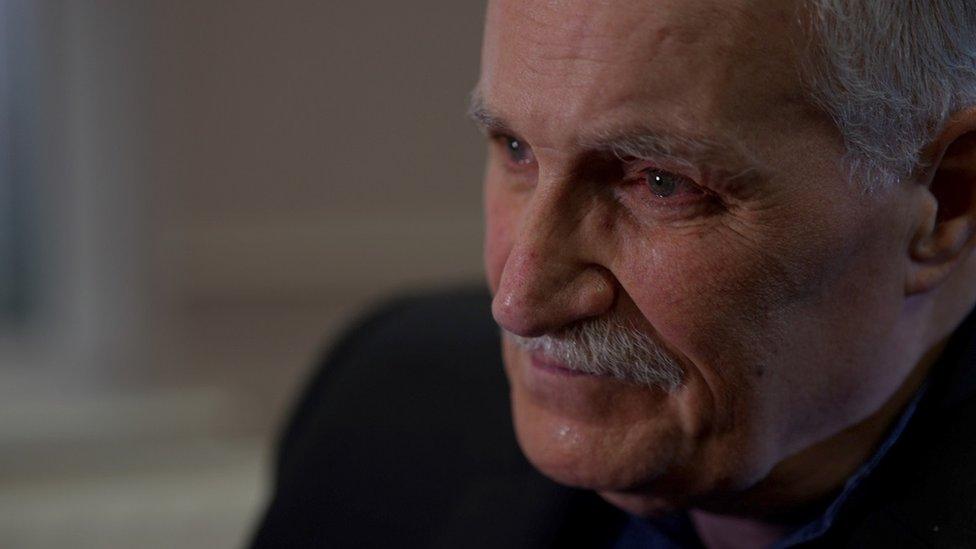
"Any time you got in trouble - you were a mongrel" - Jimmy Stewart was abused at institutions for children in Northern Ireland
Jimmy Stewart remembers getting "the mother and father of all beatings" after he ran at a nun when she was physically abusing his younger brother, Patrick.
"My hair was pulled, my clothes were ripped off me."
The vivid nature of his memories are clear when he describes how a nun beat him "with her weapon of choice - a rung from a baby's cot, with piping and light blue paint on it".
When I have spoken to survivors during their long campaign, I have often noticed how detailed their recollections are - perhaps six or seven decades after the incidents of which they speak.
Jimmy - who is now 68 - was sent to Rubane House in Kircubbin, County Down, run by the De La Salle brothers.
He remembers immediately after he arrived, one of the men told him: "So you're the tough guy from Belfast. We'll sort you here."
There was a swimming pool - but it was a source of terror, not fun.
"They used to take us down and would literally throw us in.
"There was no shallow end.
"The brother would parade round with a stick, and if you dared put your hands near the edge, he would cut the arms and knuckles off you."
He says there were "other incidents" at the home, which he "can't go into".
He still finds swimming pools are a "trigger" for flashbacks.
Brother 'changed so much' by abuse
Explaining how he became an alcoholic, Jimmy says: "If you ask anyone who's a heavy drinker, they'll tell you that you don't dream in a drunken sleep.
"You don't have nightmares. You don't have flashbacks. It numbs you. Keeps all that stuff away. Until the point it's going to kill you. Which it nearly did to me."
He describes spending "three years behind a locked door in my own house".
"I hadn't bathed or shaved. I think the last three months I spent in the same bathrobe."
He began to recover after he went into hospital.
But his older brother, Victor, "drank himself to death".
Jimmy becomes particularly emotional when he talks about how Victor was "so much changed" by what happened in Rubane House.
"We were always close. But those years took it out of us."
As an adult, Victor "couldn't discuss it - he probably didn't think there was any help for him".
Jimmy regrets deeply that Victor hasn't lived to hear the state apology.
'Why did we have to fight for an apology?'
Many other victims have died during a long campaign - often affected by addiction, a common legacy of their childhood suffering.
Margaret McGuckin, from Survivors and Victims of Institutional Abuse (Savia), says members of her group are "emotionally and mentally exhausted" after almost 15 years of lobbying.
I first spoke to her in 2009, when she phoned into the BBC Northern Ireland newsroom after seeing a TV report I had done featuring two former residents of Nazareth Lodge and Rubane House.
They had decided to speak out after the inquiry into child abuse in the Republic of Ireland, external set out the extent of suffering in institutions there.
The Ryan report was one of a series of investigations on the other side of the border, which have uncovered abuse in children's homes, institutions for unmarried mothers and industrial schools.
The organisations who ran the homes in the Republic were often also in charge of institutions in Northern Ireland.
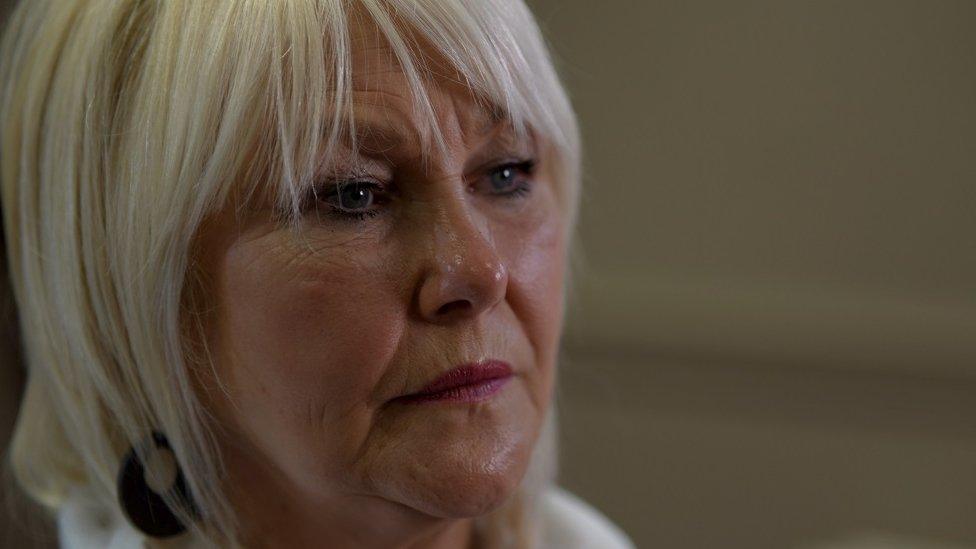
Margaret McGuckin says she did not think it would take so long for an official apology to happen
As horrific stories were gradually revealed from the 1990s onwards, there was a growing sense that people who spent time in institutions north of the border were also harbouring dreadful secrets.
Margaret credits a programme by BBC Northern Ireland's investigative journalism programme Spotlight - called Who Will Say Sorry? - as being an important moment in driving the campaign forward.
She says she did not think it would take so long for an official apology to happen.
"Why did we have to fight to get to this stage?" she asks.
Delays caused by NI government's collapse
Savia, and other survivors' groups, first lobbied for a public inquiry, which was then set up by the devolved Northern Ireland government in 2013.
Just days after the Hart report was published in 2017, the power-sharing administration in Belfast collapsed.
The recommendations of the inquiry - including a compensation scheme, an apology and a memorial - were thrown into doubt, causing renewed pain for victims.
They were forced to resort to the courts, to try to get the authorities to implement the report's recommendations.
Devolution remained in the deep-freeze for three years.
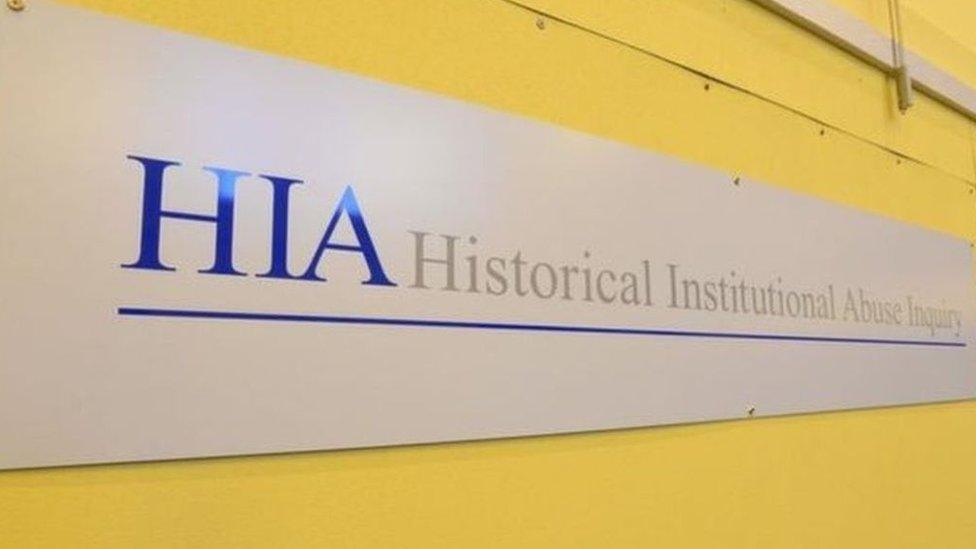
The HIA heard evidence from hundreds of people who spent their childhood in residential homes and institutions
Eventually, the UK government in London stepped in to pass legislation to set up the financial redress scheme.
Earlier this year, a date was finally set for a state apology.
That, too, seemed to be in danger after another political crisis.
But the five parties who make up the power-sharing coalition have agreed that one minister from each of them will make statements of apology on behalf of the state.
Survivors will be in the chamber of the Northern Ireland Assembly, as politicians and then representatives of the organisations who ran institutions tell them they are sorry.
Margaret McGuckin says: "We're going to be looking at them as they look at us, hopefully in the eye, and say - what we did to you was not your fault. It was ours. We let you down. We neglected you.
"We didn't listen to you when you cried out for help."
A story not fully told
She will be with her brother, Kevin, who has been in long-term care for many years.
"He was raped and repeatedly abused - mentally, physically and emotionally - in Nazareth Lodge and Rubane House.
"He probably thought it was all his fault, that he was complicit in the acts, because they gave him sweets.
"He couldn't live on the outside, because he was carrying these secrets."
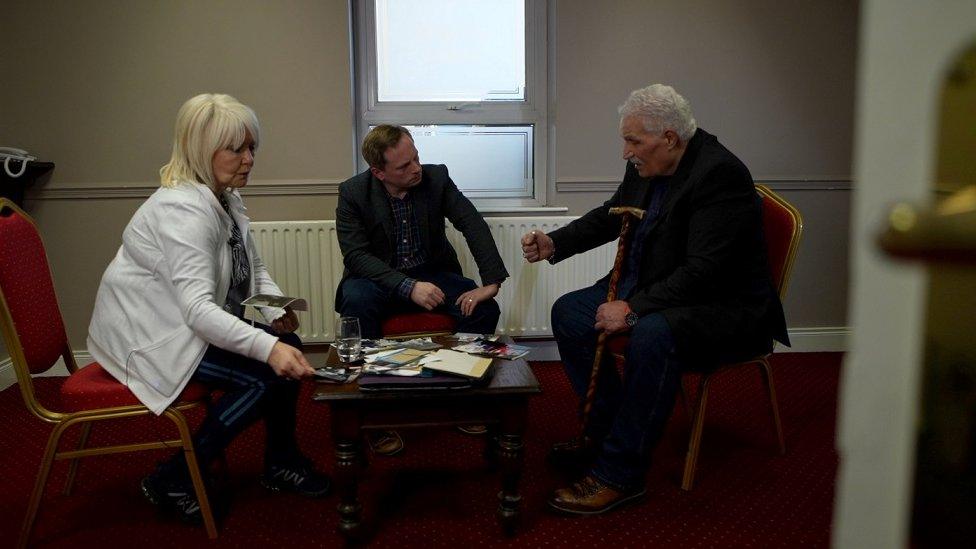
Margaret McGuckin and Jimmy Stewart speaking to BBC News NI's Chris Page
She hopes that news of the apology will reach former residents of institutions across the world - and encourage them to "speak to someone" and "remember it's not your fault".
"Don't take that shame and that blame upon you any longer," she adds.
The distressing history of institutionalisation across the island of Ireland has not been fully told.
In Northern Ireland, campaigners are continuing to call for a public inquiry to specifically examine sex abuse by members of the clergy.
The devolved government has agreed to set up an inquiry into "mother-and-baby homes" - where unmarried mothers were sent, and often made to give up their babies for adoption.
In the Republic of Ireland, legislation is being brought forward to allow for the excavation of the mass grave site at the site of a home in Tuam in County Galway, where hundreds of children are thought to be buried.
Not every survivor believes a state apology matters.
But for Jimmy Stewart, it is "huge".
"We were faceless, nameless, voiceless," he tells me.
"This apology is owed, big time."
If you have been affected by any of the issues in this report, support is available at the BBC Action Line.
You can watch the official apology from Stormont live on the BBC News NI website from 12:30 GMT on Friday.
- Published11 March 2022

- Published11 March 2022
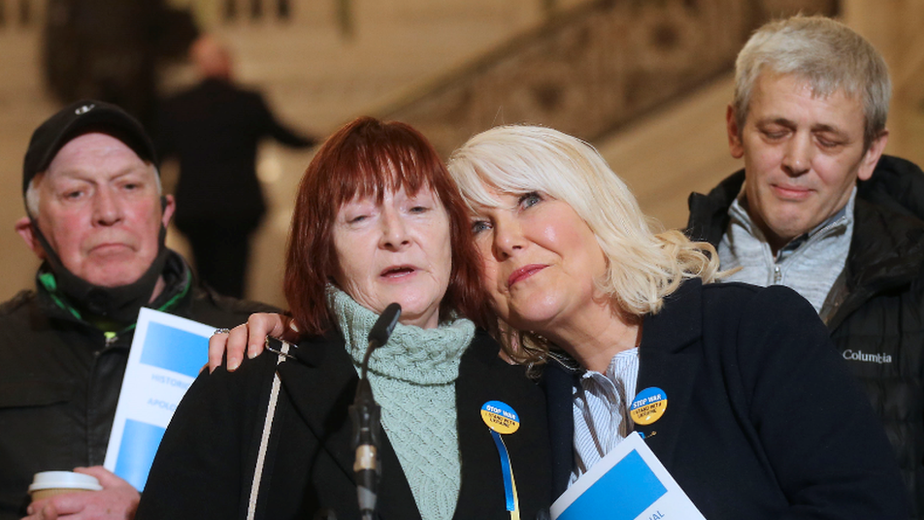
- Published11 March 2022
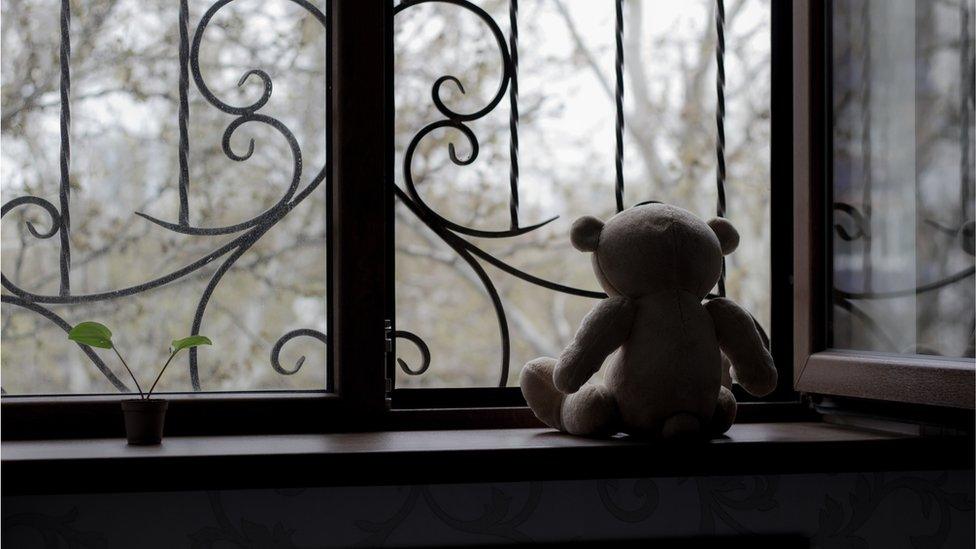
- Published20 January 2017
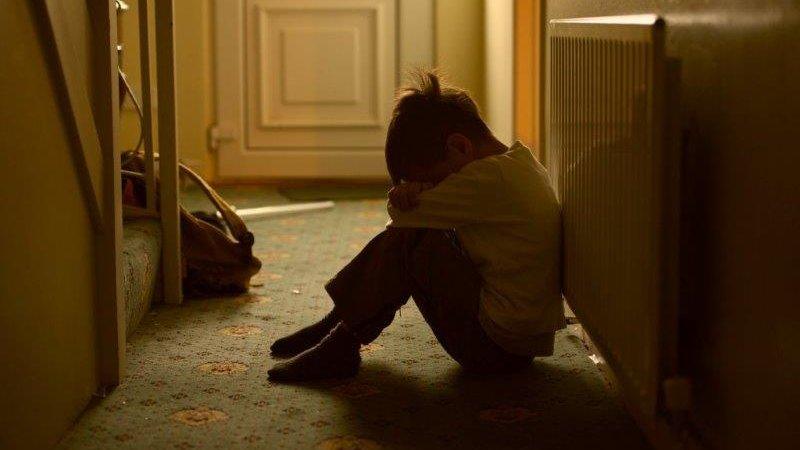
- Published20 January 2017
